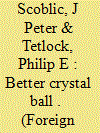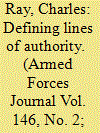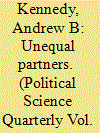|
|
|
Sort Order |
|
|
|
Items / Page
|
|
|
|
|
|
|
| Srl | Item |
| 1 |
ID:
175215


|
|
|
|
|
| Summary/Abstract |
E
verypolicy is a prediction.Tax
cuts will boost the economy.
Sanctions will slow Iran’s nuclearprogram.Travelbans will limit
the spread of COVID-19.These claims all
posit a causal relationship between
means and ends. Regardless of party,
ideology, or motive, no policymaker
wants his or her recommended course of
action to produce unanticipated consequences. This makes every policymaker
aforecaster. But forecasting is dicult,
particularly when it comes to geopolitics—a domain in which the rules of
thegame are poorly understood, information is invariably incomplete, and
expertise often confers surprisingly little
advantage in predicting future events.
These challenges present practical
problems for decision-makers in the
U.S.government.
|
|
|
|
|
|
|
|
|
|
|
|
|
|
|
|
| 2 |
ID:
086816


|
|
|
|
|
| Publication |
2009.
|
| Summary/Abstract |
Since the administration of President Dwight Eisenhower, newly appointed American ambassadors have been given a presidential letter outlining their authority over U.S. government programs and personnel in the country to which they are accredited. The letter describes the ambassador or chief of mission (COM)as the personal representative of the president, with full authority for the direction, coordination and supervision of all U.S. government executive-branch employees, except those under a combatant commander (COCOM).
|
|
|
|
|
|
|
|
|
|
|
|
|
|
|
|
| 3 |
ID:
153788


|
|
|
|
|
| Summary/Abstract |
The U.S. Constitution is best understood not as a “social contract,” but as a popularly issued corporate charter. The earliest American colonies were literal corporations of the Crown and, like all corporations, were ruled by limited governments established by their charters. From this, Americans derived their understanding of what a constitution is—the written charter of a sovereign that ordains and limits a government. The key Federalist innovation was to substitute the People for the King as the chartering sovereign. This effectively transferred the “governance technology” of the corporation to the civil government—including the practice of delegating authority via a written charter, charter amendment, and judicial review. Federalists used these corporate practices to frame a government that united seeming irreconcilables—a government energetic yet limited, republican yet mixed, popular yet antipopulist—yielding a corporate solution to the problem of arbitrary rule. Leading founders considered this new government a literal chartered corporation of the People.
|
|
|
|
|
|
|
|
|
|
|
|
|
|
|
|
| 4 |
ID:
193523


|
|
|
|
|
| Summary/Abstract |
The U.S. government should establish a nongovernmental institute of expert spokespersons to counter foreign disinformation and propaganda more effectively. Such an institute would provide a media-friendly source of information and perspective from experts totally immersed in the relevant subject matters. They would debunk false charges, but also reframe the discussion to reveal disinformers’ records of lies as well as the quirks of human belief that make many people susceptible to false claims. Government can play an essential role in uncovering the secret machinations of hostile state actors, but typically chooses spokespersons who are managers rather than subject matter experts. Not only do they lack in-depth knowledge of often obscure subjects, but also lack the autonomy to freely discuss highly controversial subjects. Nongovernmental expert spokespersons would suffer neither deficiency.
|
|
|
|
|
|
|
|
|
|
|
|
|
|
|
|
| 5 |
ID:
179154


|
|
|
|
|
| Summary/Abstract |
In a blog post in June 2016, the threat intelligence company CrowdStrike attributed the breach of the Democratic National Committee’s (DNC’s) networks to two groups of cyber actors closely linked to the Russian government.1 The DNC had requested CrowdStrike’s assistance and gave it permission to share the results of their attribution finding with the public. CrowdStrike explained that part of what motivated the publication of their finding was to “help protect even those who do not happen to be our customers.
|
|
|
|
|
|
|
|
|
|
|
|
|
|
|
|
| 6 |
ID:
147112


|
|
|
|
|
| Summary/Abstract |
It has been more than seven years since U.S. President Barack Obama [1] issued Executive Order 13491 [2], banning the U.S. government’s use of torture. Obama’s directive was a powerful rebuke to the Bush administration, which had, in the years after the 9/11 attacks, authorized the CIA and the U.S. military to use “enhanced interrogation tech¬niques” in questioning suspected terrorists. Some detainees were shackled in painful positions, locked in boxes the size of coffins, kept awake for over 100 hours at a time, and forced to inhale water in a process known as water¬boarding. Interrogators sometimes went far beyond what Washington had authorized, sodomizing detainees with blunt objects, threatening to sexually abuse their family members, and, on at least one occasion, freezing a suspect to death by chaining him to an ice-cold floor overnight.
|
|
|
|
|
|
|
|
|
|
|
|
|
|
|
|
| 7 |
ID:
188381


|
|
|
|
|
| Summary/Abstract |
The U.S. government list of state sponsors of terrorism is dated, politicized, analytically muddy, and in general not useful for distinguishing which states truly sponsor terrorism and how aggressively they do so. A better list and process would identify different criteria that go into sponsoring terrorism and, in so doing, create multiple de facto lists. Lists would distinguish important factors such as the use of terrorism in war and the problematic criterion of states using their own clandestine agents for terrorism-like violence. Different forms of passive support would also be assessed, particularly because state passivity is often vital for jihadists and white supremacists, two of the greatest terrorism dangers today. The political and analytically flawed nature of the state sponsor list and process, however, is as much by design as it is by accident, and change is especially difficult as a result.
|
|
|
|
|
|
|
|
|
|
|
|
|
|
|
|
| 8 |
ID:
152856


|
|
|
|
|
| Summary/Abstract |
ANDREW B. KENNEDY argues that the globalization of research and development has generated an interdependence among the United States, China, and India, but such that generally favors Washington. Nonetheless, several constraints make it difficult for the U.S. government to exploit this potential.
|
|
|
|
|
|
|
|
|
|
|
|
|
|
|
|
|
|
|
|
|